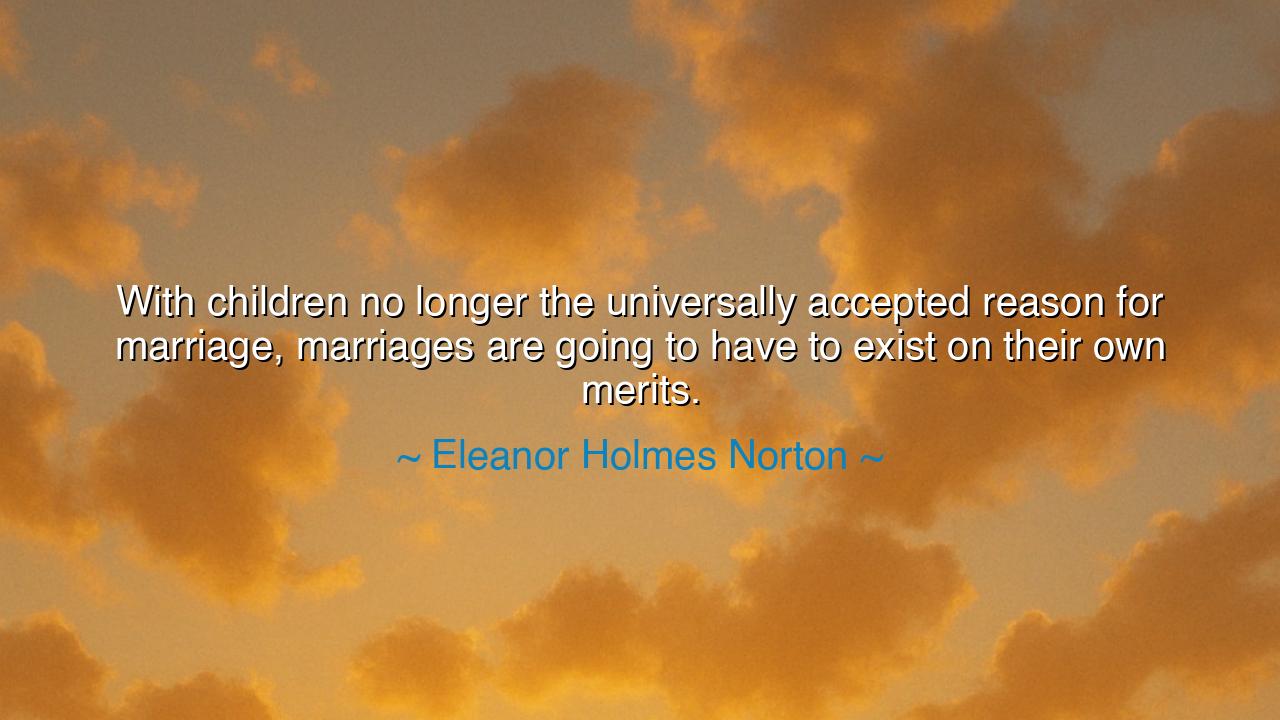
With children no longer the universally accepted reason for
With children no longer the universally accepted reason for marriage, marriages are going to have to exist on their own merits.






"With children no longer the universally accepted reason for marriage, marriages are going to have to exist on their own merits." – Eleanor Holmes Norton
In these wise and discerning words, Eleanor Holmes Norton, a woman of intellect and courage, speaks to a profound transformation in the human understanding of marriage. Once, the union between two people was seen primarily as a vessel for children — the continuation of lineage, the preservation of family name, the assurance of survival in uncertain times. But Norton observes that in the modern age, that ancient justification has begun to fade. In its place, she declares, marriage must now “exist on its own merits” — not as a duty to tradition or necessity, but as a living, conscious choice between equals, bound not by obligation, but by love, respect, and shared purpose.
The origin of this quote lies in Norton’s reflections as a scholar, feminist, and lawmaker during an era of immense social change. As women gained greater autonomy and as society’s views on gender, sexuality, and parenthood evolved, the once rigid institution of marriage was forced to redefine itself. Norton’s insight captures this pivotal moment — when love and partnership could no longer hide behind custom or convention. She warns, with both realism and hope, that marriage must now stand on the strength of the hearts within it. It must prove its worth not through offspring or expectation, but through mutual devotion, emotional growth, and shared integrity.
The ancients understood marriage as a sacred bond ordained not only by love but by the laws of life itself. In early civilizations, it was the cornerstone of community — an agreement that united tribes, secured inheritance, and ensured the survival of the next generation. Yet even then, there were whispers among philosophers and poets that the truest unions were those founded on affection and virtue, not on necessity alone. The Roman writer Cicero once said that “friendship is the noblest of all relationships,” and indeed, when marriage is built upon friendship — upon equality, admiration, and the meeting of souls — it transcends its utilitarian roots and becomes something divine.
In the modern world, where couples may choose not to have children, Norton’s wisdom calls us to a deeper truth: that love must justify itself. Without the external structure of family obligation, the bond must find its meaning inwardly. Partners must ask: Who are we to each other beyond parenthood? What do we give, create, and inspire in one another? To sustain a marriage in this new age requires a kind of maturity the ancients revered — the understanding that love is not sustained by circumstance, but by the daily act of choosing.
Consider the story of Eleanor Roosevelt and Franklin D. Roosevelt, whose marriage was tested not only by distance and duty, but by the demands of history itself. Though theirs was not a traditional love story, they remained bound by shared ideals, mutual respect, and a sense of purpose greater than themselves. Their union endured, not because of convention, but because of merit — because it grew into a partnership of minds and spirits, transcending the expectations of their age. In their lives, we see Norton’s truth illuminated: that a marriage built upon respect and shared vision can outlast even passion itself.
Yet, Norton’s reflection carries a warning as well as wisdom. For when marriage is freed from the anchor of expectation, it must also guard against drifting into emptiness. If two people do not nurture connection, if they forget the sacred responsibility of tending to one another’s hearts, their bond will wither. Love without intention decays; commitment without care becomes a shell. Thus, the survival of marriage in this age of choice depends not on social structures, but on the inner discipline of love — the conscious effort to build, renew, and honor the bond each day.
So, my children of the heart, take this teaching as both challenge and promise: let your unions be built not on need, but on nobility. Enter marriage not as refuge from loneliness, but as an act of courage — the courage to grow alongside another soul. Let your love be a work of art, created not by circumstance, but by choice. Cultivate kindness, practice forgiveness, and celebrate each other’s individuality, for only through these virtues can your partnership endure the trials of time.
For in the end, Eleanor Holmes Norton speaks not only of marriage, but of the evolution of love itself. When she says that marriages must now “exist on their own merits,” she is calling humanity to a higher standard — to a love that stands not because it must, but because it is worthy. And such love, born of freedom yet rooted in fidelity, is not weaker than the love of old — it is stronger, truer, and more divine, for it is chosen anew with every dawn.






AAdministratorAdministrator
Welcome, honored guests. Please leave a comment, we will respond soon